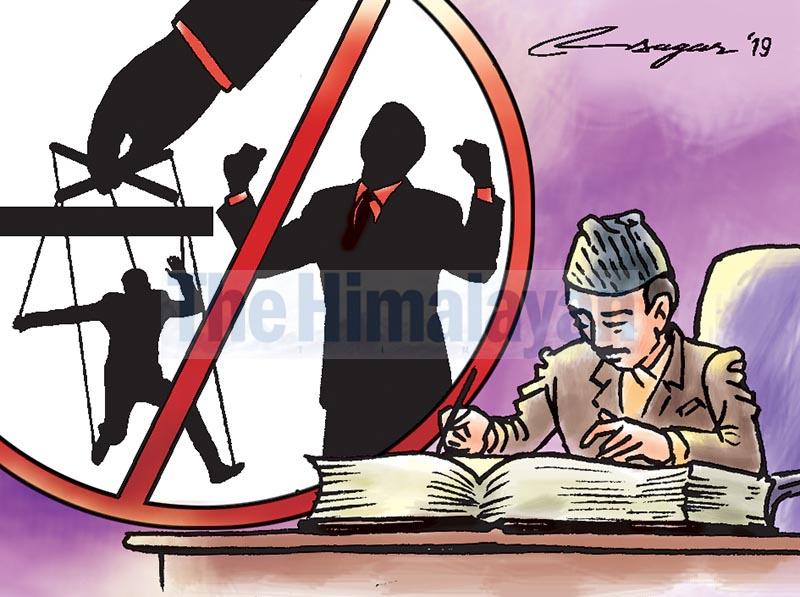Decline of constitutionalism: Ensure separation of powers
Let us not forget that no matter how well our constitution has been written or how democratic it is, an authoritarian regime is a possibility even under the most democratic constitution
Nepal ranked 97 out of 167 most democratic countries in the world, according to the Economic Intelligence unit 2018. Today we have a democratic republic constitution, which in its form and substance has tried its best to ensure democracy in all aspects. It entrusts 31 fundamental rights, a fully elected legislature through free and fair elections, multiparty competitive democracy, checks and balance, and a free and independent judiciary. However Nepal was surpassed in the aforementioned rankings even by constitutional monarchies like Norway, Sweden, New Zealand and Denmark, which ranked 1, 3, 4 and 5 respectively.
Nepal’s 1990 constitution, based on constitutional monarchy, was considered a remarkable achievement, and many still believe that it was better than all the constitutions formulated till date. Even South Africa referred to our constitution while promulgating its 1996 constitution. I believe that failure of the 1990 constitution was not because we desperately needed federalism and inclusivity. Rather it was because we failed to ensure constitutionalism, that is, our others organs, including the judiciary, parliament and civil societies, failed to deliver and restrict the monarch’s power.
Around the world, other organs have restricted the power of autocratic leaders when the arrival of fascism was sensed both in the republic and constitutional monarchical countries. In Luxembourg, when the king refused to give consent to the Euthanasia Bill, the parliament in 2008 restricted the king’s power to approve a bill passed by the Parliament. We overthrew the decade-and-a-halflong constitutional monarchy, claiming full democracy and liberty could not be enjoyed under that constitution. And we believed the country’s requirements could not be fulfilled solely through decentralisation, so devolution of power through federalism became a need.
As per the positive theory of law, law becomes law not when it’s mentioned on paper but when observed in the society. Similarly, the robustness of a country’s democracy isn’t determined solely by its constitution but through the practice of constitutionalism. Cambodia’s constitution ensures voting rights to all citizens and ensures free and fair election through the competition of various political parties. However, in practice, there is complete absence of constitutionalism. As a result, the authoritarian Prime Minister, Hun Sen, has been in power since 1985. Elections in Cambodia are conducted every five years, however, Cambodians think that with every election the country is moving into absolute dictatorship.
Strong constitutionalism is based on the principle that the constitution should be held higher than any ruler and all organs of the government. And if the government tries to establish an authoritarian regime, other constitutional organs have to restrict the government’s powers as per the guidelines of the constitution.
The ideology of popularism of a leader by taking a stand on nationalism is on the rise throughout the world. Leaders have tried to make their countrymen believe that their so-called strong stand on nationalism, based on the feeling of hatred towards a certain group of people, is genuine. This approach is not only a serious threat to constitutionalism, but, for countries like ours that have adopted the Westminster parliamentary system, it also decreases the voice and power of the Parliament.
In a parliamentary system, each constituency elects its representatives to the Parliament. If the Parliament is too weak to warn the Prime Minister that her/ his activities aren’t as per the demand and expectations of the people, the citizens’ voices can go unheard. We already have a history of leaders enjoying unconstitutional powers and liberty. Strong monarchs were needed in the past to repel aggressors and to maintain order. Because power tends to be abused, they developed into tyrants. So democracy was restored, however, a democratic government can also turn tyrannical through ways other than by law. The rise of populist leaders whose actions aren’t being genuinely restricted or checked by the parliament or judiciary means that many countries are sensing the decline of constitutionalism.
Another challenge we are facing is the failure of the principle of the separation of powers. Power is separated to ensure that the executive could be controlled or checked by the legislature, judiciary or other constitutional commissions at times. But in reality, majority of the members of the legislature are from the political party that runs the government. So what the legislature approves or disapproves is indeed decided by the government itself.
Though the judiciary should be independent, as judges of the apex court are appointed without the influence of the government through the Constitutional Council and a public hearing, our judiciary is heavily influenced by the political parties. If the judiciary cannot speak against the government at crucial times and intervene in the formation of unjust laws, it means the separation of powers does not exist. Protection of constitutionalism has always been a challenge, and we must not forget that no matter how well our constitution has been written or how democratic it is, an authoritarian regime is a possibility even under the most democratic constitution. And an elected dictatorship is worse than a military or hereditary dictatorship.






